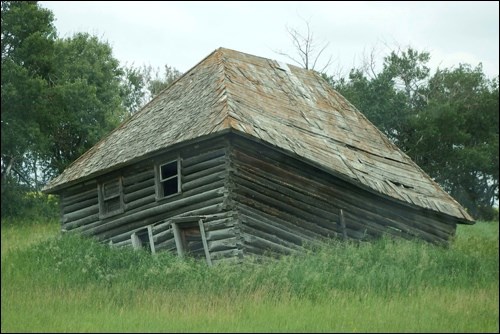A century ago the plain on which I live was still a buffalo pasture, although the great beasts and those who hunted them were gone. Then homesteaders came and, 97 years ago, a new railway branch was completed and it spawned a tiny village. The villagers planted trees, hedges and gardens, which flourished because of water from the railway’s never-failing spring. Yellow leaves fell in the month of my birth 90 years ago. They are falling now.
Most surviving communities on Saskatchewan’s great plain now have indoor bathrooms, natural gas heat, and electric power from the provincial grid. They are linked to the larger world by sophisticated communications systems.
When I was a boy the villages of Saskatchewan were isolated, linked to distant places only by steel rails and telegraph wires. Little in village life began to change until after the Second World War.
I was 10 years old when the leaves began to fall in 1937. They fell from Russian Poplars and Manitoba Maples, the only trees the villagers had planted. I was familiar then with the unchanging rituals of the seasons. With the first sustained thawing temperatures, snow, pockmarked with black ash from wood and coal stoves, began to retreat into the caragana hedges. Buds on the poplar trees began to swell, injecting the air with the scent of returning growth. The villagers returned to their gardens to dig with forks and level with rakes. In the days that followed the air was filled with the scent of lilac blossoms. By mid-summer the darkening hours brought the powerful perfume of night-scented stocks. I knew little about the distant world, but I did know my home was in a small oasis surrounded by dust and desolation. People were leaving the prairie lands for the orchards of British Columbia, the Alberta irrigation districts and were going to carve out homesteads in the northern forests.
Although the Fairbanks-Morse diesel engines in the grain elevators barked less frequently than in previous years, people still remained in the village. As the yellow leaves began to fall, they fuelled bonfires in the deep ditches along every street. People dug up their root crops to store in their cellars, which were usually small dugouts within the larger perimeter of surface foundations of concrete. From every kitchen came the mouth-watering smell of sweet relish. There were not so many processed foods for sale then. . Nor were there many plastic wrappers and containers other than those made from cellophane and celluloid.
The serious business of preparing for winter began when the storm windows were examined and broken panes of glass cut and puttied in by the man at the hardware store. The man at the lumberyard sold tarpaper and lathes to make barriers extending from ground level to above the top of surface foundations. Earth was then banked up around the building. Sometimes it was rich blow dirt hauled from wind-piled ridges along country fence lines. The tractor-driven saw in the wood yard whined for hours cutting slabs brought from Up North into stove lengths. Trains disgorged coal into trackside bins and draymen hauled loads of it away to fuel the stoves and furnaces of the village. Merchants made sure there was good supply of coal oil because there were still houses illuminated by coal oil lamps.
As snow began to fall, we heard the jingle of bells on horse-drawn sleighs. Winter clothing was ordered from the T. Eaton Company in Winnipeg. I remember that the standard costume for little boys included whipcord breeches, high top moccasins and fur-trimmed helmets patterned after the ones fliers wore in the Great War.
As Christmas approached, toys, books, gramophone records and assorted delicacies were also ordered from Eaton’s, but never in great quantity or at great cost. There were always Christmas trees, but some people made do with the skeleton of a bush adorned with the wrappers from Blue Goose oranges. The turkey was always locally grown and prepared, stuffed and cooked by Mother or Grandma. Sometimes Grandpa presented himself with a bottle of homebrew.
When I was 10, the village was burdened with inconveniences, but we had simple pleasures. We had homegrown food, homegrown entertainments and homegrown security. We lacked fear. Whatever the emergency, there was always someone near at hand to care and give aid.
After the fallen leaves have been raked up, snow will come. So will Christmas. Believers and non-believers alike will exchange rich gifts. Make mine simplicity



